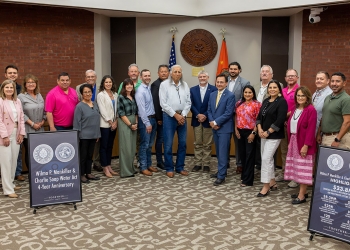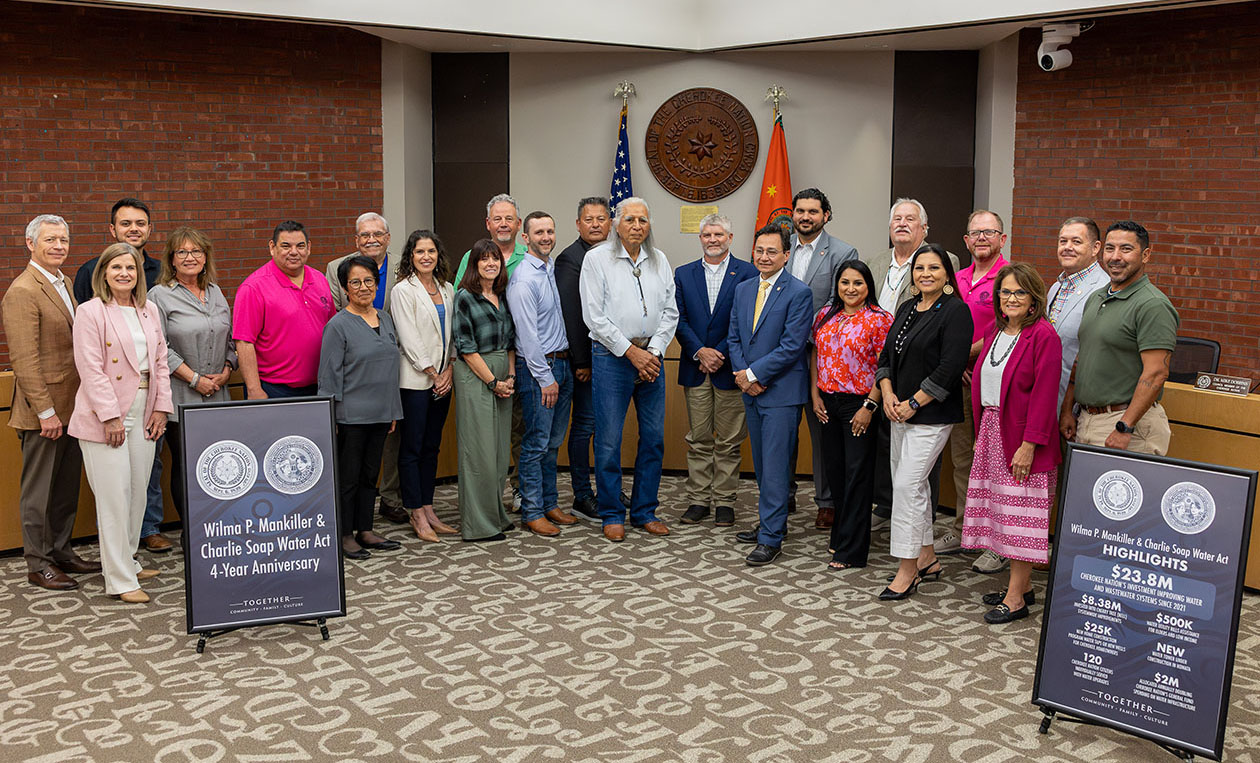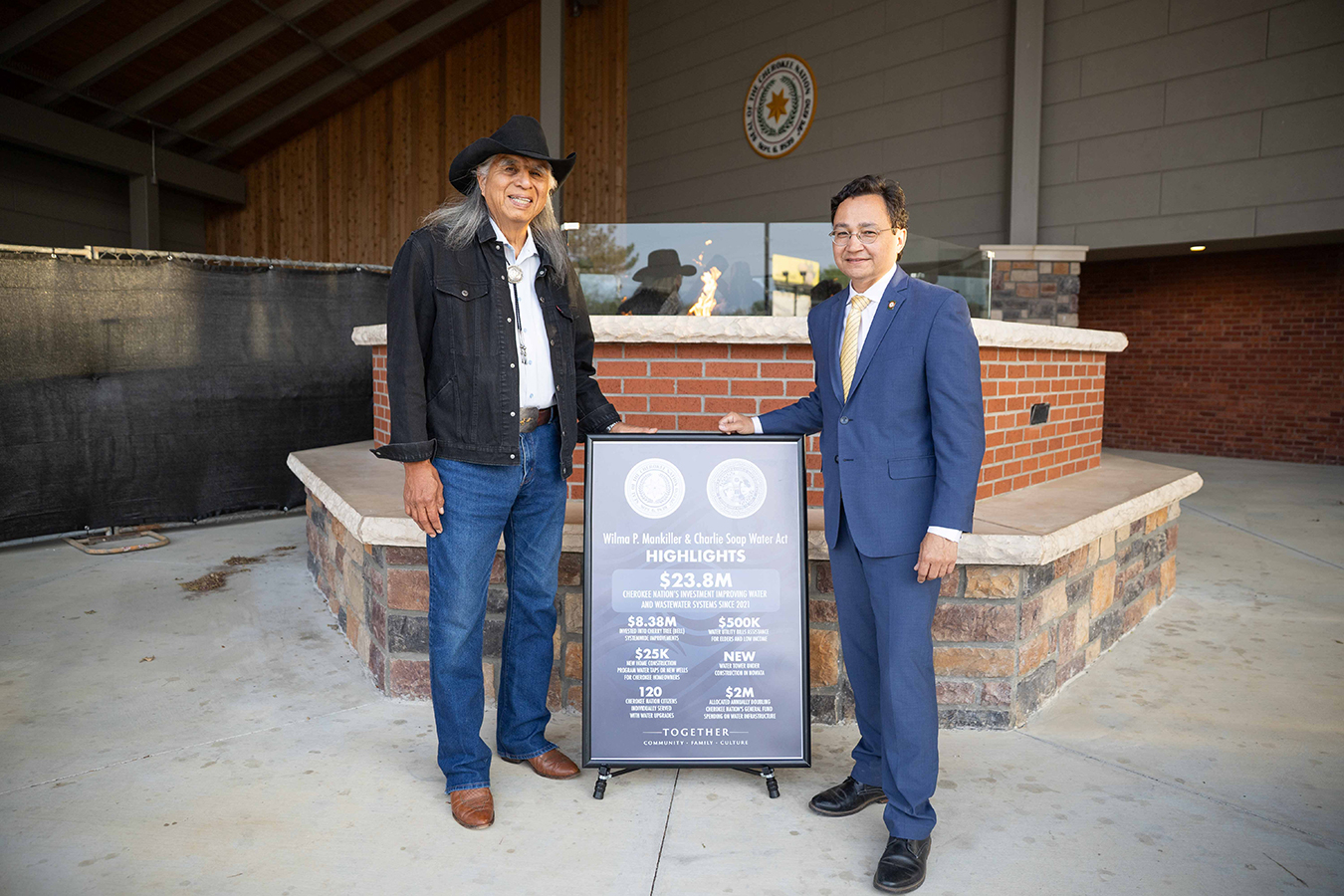News
Cherokee Nation
Posted: Apr 15, 2025 9:34 AMUpdated: Apr 15, 2025 9:34 AM
Cherokee Nation Invests $23.8M for Water Improvements

The Cherokee Nation is celebrating the four-year anniversary of the Wilma P. Mankiller and Charlie Soap Water Act including spending $23.8 million so far to date for water investments made in that time to increase water quality access for Cherokee Nation citizens across the reservation.
The Cherokee Nation Wilma P. Mankiller and Charlie Soap Water Act is a legislative initiative to improve access to clean and safe water signed into law in April 2021 by Principal Chief Chuck Hoskin Jr. and Deputy Chief Bryan Warner.
It was named to honor the legacy of late former Principal Chief Wilma Mankiller and her husband, Charlie Soap, who were instrumental in water access projects in the 1980s, including the historic Bell water line in Adair County.
Studies indicated the community and water district of Cherry Tree needed $11 million in repairs and maintenance. Through the act the Cherokee Nation has invested $8.38 million for systemwide improvements to water lines serving over 800 Cherokee homes. In honor of Chief Mankiller and Charlie Soap’s work on the Bell water line which is part of the Cherry Tree Water District, the act placed a priority on repairing and modernizing that water system.
Cherry Tree Water District is wholly owned and operated by the water district. Cherokee Nation has no ownership or operational control over the system.
"Four years ago, the Cherokee Nation took a significant step forward with the Wilma P. Mankiller and Charlie Soap Water Act, a measure inspired by the enduring legacy of two visionaries who dedicated their lives to uplifting our communities. Today, we reflect on the progress we’ve made and the profound impact this act has had on the lives of our Cherokee citizens,” Chief Hoskin said. “From the $8.38 million investment in the Cherry Tree community to the construction of a new water tower in Nowata and ensuring access to clean water for 120 citizens identified through our water survey who do not have adequate access to water, these investments represent far more than infrastructure—they represent a commitment to health, safety, and dignity for our people.”
The tribe’s repairs to water line leaks in Cherry Tree helped John McCullough who lives in the community with his wife and young daughter.
“We used to have lots of repair trucks always out here before, but now we have good water pressure and no more issues, so we are incredibly pleased with the tribe’s efforts,” McCullough said.
The act has also utilized half a million to help elders or those low income with water utility bills, and $25,000 to help put in new water taps for homes under the new home construction program.
A water tower is being built in Nowata, and 120 Cherokee Nation citizens identified in a water survey last year through the tribe are being individually served with water upgrades.
“This truly is helping families across our reservation with good, safe water, something many of us take for granted but affect so many of our citizens especially in rural communities,” said Deputy Chief Bryan Warner. “The true spirit of this work reflects ‘gadugi’—coming together as one community. The anniversary is a moment to honor not only the legacy of Chief Mankiller and Charlie Soap but also the collective efforts of our communities, departments, and leaders who have worked to achieve this.”
The Cherokee Nation Transportation and Infrastructure Department has also worked with cities, towns and water districts to GPS their water systems so the Cherokee Nation has a digital map to know across the Cherokee Nation where they can tap into water saving time and work efficiency.
“Some city water departments had no maps, or had paper copies, so this is a new tool that can make water access extremely more efficient for everyone,” said Council Speaker Mike Shambaugh.
The Mankiller Soap Water Act allocates a minimum of $2 million annually, doubling the Cherokee Nation's general fund spending on water infrastructure projects. It prioritizes addressing deficiencies in water and wastewater systems, particularly in rural and underserved areas within the reservation.
“It was an honor to work with Chief Mankiller in those early days getting water to these communities. At the time we didn’t know we were making all of these impacts as we were just working, putting water lines in, which I enjoyed tremendously,” Charlie Soap said. “It’s interesting to watch all the progress the Cherokee Nation is making. I want to thank you for all you do for our people and supplying the need for water is a tremendous responsibility. Thank you for doing what you’re doing and appreciate this recognition and for Chief Mankiller. We never thought we would reach this place where so many people have water.”
As part of the anniversary celebration, Chief Hoskin announced an increase to spending under the act by $500,000 using the tribe’s Public Health and Wellness Fund Act revenue.
“I was proud to sponsor the Mankiller Soap Water Act,” said Councilor Joshua Sam. “It was always designed to be a major step in fully restoring the Cherry Tree Water District, but the more than $8.38 million dollars investment means we have taken a major step to ensure our communities have access to clean water.”
The act requires biennial studies. The Cherokee Nation's Department of Transportation and Infrastructure is tasked with conducting studies to identify citizens lacking access to reliable water systems and developing action plans to address these gaps.
Citizens are also encouraged to participate in water quality surveys to help map out areas with poor water access and quality. The act emphasizes improving rural water systems and prioritizes low-income applicants for individual assistance.
This legislation builds on the Cherokee Nation's commitment to ensuring that all citizens have access to safe, running water, improving health and quality of life across the reservation.
Last year 1,900 Cherokee Nation citizens who live on the reservation responded to the survey, 120 Cherokee Nation citizens self-reported they had poor or insufficient water quality.
“We are reaching out to all of those on how best to serve them,” said Michael Lynn, Director of Transportation and Infrastructure.
The act investments also measured 8,000 homes without access to public water systems: 121 small public water systems and 53 public sewer systems within the Cherokee Nation Reservation. To date, the Cherokee Nation has allocated $65 million for Mankiller Soap Water Act projects in which $23.8 million has been spent. For the full report CLICK HERE.

Cherokee Nation Principal Chief Chuck Hoskin Jr., Charlie Soap, the Council of the Cherokee Nation, Deputy Secretary of State Canaan Duncan, CNB CEO Chuck Garrett, Michael Lynn, Executive Director of Roads and Infrastructure and other cabinet celebrate the four-year anniversary of the Wilma P. Mankiller and Charlie Soap Water Act during April’s Council meeting. Photo courtesy Cherokee Nation

Principal Chief Chuck Hoskin Jr. and Charlie Soap celebrate the water investments across the Cherokee Nation Reservation on the four-year anniversary of the Wilma P. Mankiller and Charlie Soap Water Act. Photo courtesy Cherokee Nation
« Back to News















